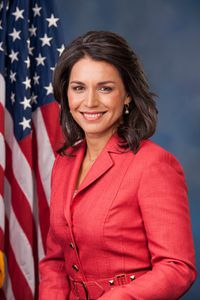The U.S. Senate voted to confirm Tulsi Gabbard as director of national intelligence on Feb. 12, 2025. The Senate voted 52-48 in favor of her nomination with one Republican, Sen. Mitch McConnell (R-Ky.), joining all 45 Democrats, and both independent senators who caucus with Democrats, in opposing her nomination. This was the 14th member of President Donald Trump’s (R) Cabinet confirmed in his second presidential term.
Trump announced on Nov. 13, 2024, that he had selected Gabbard as his nominee for director of national intelligence. Trump said of Gabbard’s nomination, "For over two decades, Tulsi has fought for our Country and the Freedoms of all Americans. As a former Candidate for the Democrat Presidential Nomination, she has broad support in both Parties - She is now a proud Republican! I know Tulsi will bring the fearless spirit that has defined her illustrious career to our Intelligence Community, championing our Constitutional Rights, and securing Peace through Strength." The Senate Intelligence Committee held a confirmation hearing for Gabbard on Jan. 30, 2025, and voted 9-8 to advance her nomination.
In 2002, Gabbard won election to the Hawaii House of Representatives. She served in the House until 2004 when she resigned to deploy to Iraq. Gabbard was a member of the Hawaii Army National Guard from 2003 to 2020. In 2020, she transitioned to an Amy Reserve unit based in California. She was deployed on two tours of duty in the Middle East. Between the two tours, Gabbard graduated from the Accelerated Officer Candidate School at the Alabama Military Academy and received a B.S. in business administration from Hawaii Pacific University.
Gabbard was elected to the Honolulu City Council in 2010. She served on the council until 2012, when she ran for and won a seat in the U.S. House, representing Hawaii's 2nd Congressional District from 2013 to 2021. She also ran for president of the United States in 2020 as a Democrat before becoming an independent in 2022 and then a Republican in 2024.
A presidential Cabinet is a group of senior federal officials who advise the president on the issues and activities of their respective agencies. The number of officials in a Cabinet can vary across presidential administrations. While not explicitly identified in the Constitution, the Cabinet secretaries are the 15 agency heads who are in the presidential line of succession. The vice president is also part of the Cabinet.
During Trump's second term, the following offices are also Cabinet-rank positions: White House chief of staff, the administrator of the Environmental Protection Agency, the director of the Office of Management and Budget, the U.S. trade representative, the director of the Central Intelligence Agency, the director of National Intelligence, the administrator of the Small Business Administration, and the ambassador to the United Nations.



